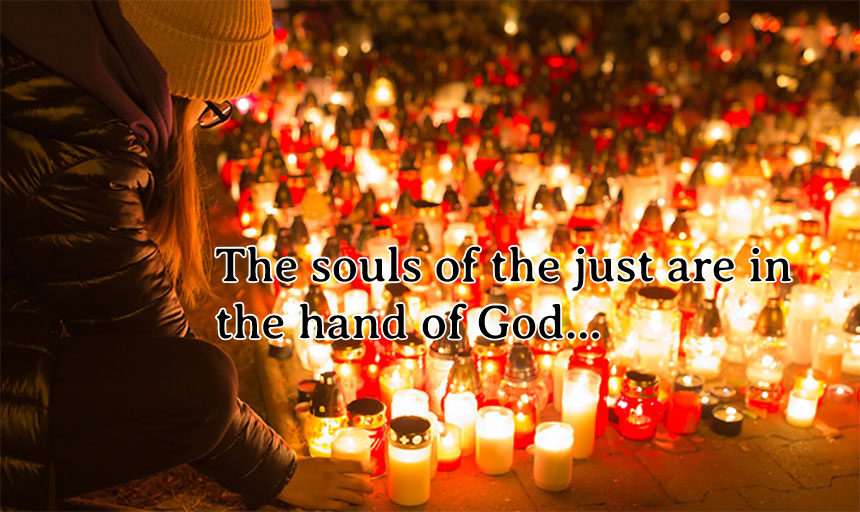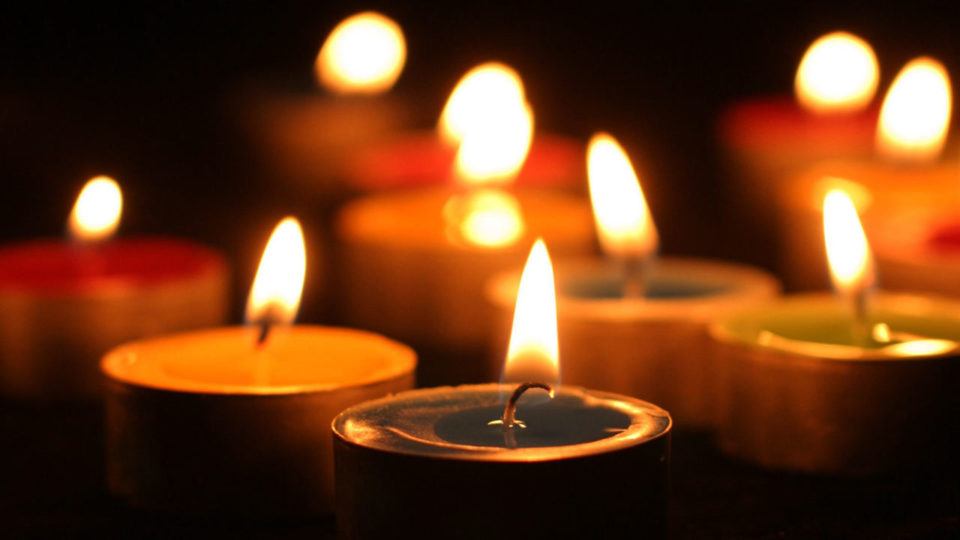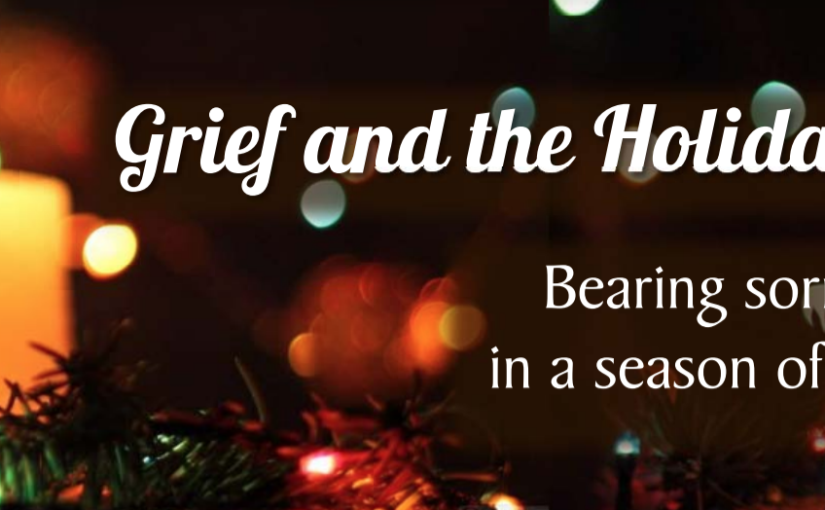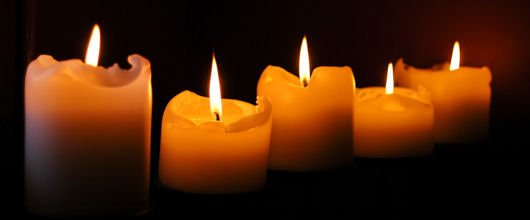On the Sunday closest to All Souls Day (November 2), we offer a remembrance Mass for those who have died during the past year.
The souls of the just are in the hands of God. His care is with his elect. We shall also be united with him in the resurrection. Death no longer has power over him. Inherit the kingdom prepared for you from the foundation of the world. Today’s Liturgy of the Word has good news for those of us who have lost loved ones, whether it be in the past year, or even the more distant past. The passing of time doesn’t take all the sorrow away, we know that, but it does give God a chance to bring us healing and grace and fond memories.
We have come here today to do just that: to remember our loved ones who have passed away and now have hope of immortality. We pray for their souls and commend them to our loving God that he might, in his great mercy, open the gates of the heavenly kingdom for them and give them the eternal reward for which they have long hoped.
This morning’s Gospel reading presents us with perhaps the foundational principal of living the Christian life: love of God and love of neighbor. We love God with great fervor because he loved us into existence. And God teaches us how to love: to love him and to love others; in fact we manifest our love of God in very real ways by loving others. Loving others is what brings us here together this morning as we celebrate our annual Mass of Remembrance for those who have gone before us, marked with the sign of faith. Our love of them doesn’t end when they leave us; and it is that love that intensifies our grief. And so we gather this morning to remember and to take solace in God’s love for us, knowing that the grave is no obstacle to love, and that death has been defeated by our Savior who loves us more than anything.
Here at Saint Mary’s, we celebrate a good many funerals every year. So, as your pastor, I’m acutely aware of the grieving of our community. And I can relate to it: in the past few years, I celebrated the funeral of my mother, two of my uncles on my Dad’s side of the family as well as an uncle on Mom’s side; a stark reminder that as I get older, we are losing that previous generation, and I am missing their presence in our lives.
I want to pause here and speak a little about the reality of grief. Because, if there is one thing that we as a society do extremely poorly, it’s grieving. It seems like we rush through it and hope it’s all done before we have a chance to feel any kind of pain. We want to get this thing done with, check the boxes, and move on. That’s part and parcel of how things work in our world: we have a pill for every malady and a quick remedy for every pain, plagued with a whole host of horrifying side effects. And what’s important to know is that this is not how the Church teaches us to grieve. One of the most important reasons that we have All Souls Day each year is to give us the experience of remembering and grieving and healing. If you truly love, you will truly grieve, and not turn away from it.
The Church’s Catechism (989) teaches us: “We firmly believe, and hence we hope that, just as Christ is truly risen from the dead and lives for ever, so after death the righteous will live for ever with the risen Christ and he will raise them up on the last day.” And so we Christians never grieve as if we have no hope. The Church’s Liturgy echoes this hope in the third Eucharistic Prayer: “There we hope to enjoy for ever the fullness of your glory, when you will wipe away every tear from our eyes. For seeing you, our God, as you are, we shall be like you for all the ages and praise you without end, through Christ our Lord, through whom you bestow on the world all that is good.” One of the Prefaces to the Eucharistic Prayers for the Dead makes it very clear that this hope touches our experience of grieving: “In him the hope of blessed resurrection has dawned, that those saddened by the certainty of dying might be consoled by the promise of immortality to come (Preface I for the Dead).”
And so I have some tips on grieving that I hope you will find helpful:
- First, don’t rush into the funeral. It’s hard to make all those difficult decisions at a moment’s notice. It’s great if you’ve talked about your wishes with your family, because it makes things easier. But if that hasn’t happened, the family would do well to take its time and avail itself of the resources of the funeral director and the church staff so that a funeral that adequately honors the deceased and comforts the living can be prepared.
- Parents: please talk to your children about your funeral. Yes, that’s going to be a hard conversation. But these days, too many young people are so disconnected from the Church and so averse to any kind of unhappiness, that they really don’t know how to grieve. You have to help them with that.
- Let other people help you. Even if you can do all the preparations, you don’t have to, and you probably shouldn’t. Let the Church and others help you and minister to you in your time of grief. As a priest, I presided at my father’s funeral, but one of the priests who knew him preached the homily. At both of my parents’ funerals, I availed myself of the presence of a bereavement minister to help me plan the funeral. Did I know how to plan a funeral? Of course. But I found that I needed to be ministered to in my own grieving. On those days, I wasn’t only the priest celebrant, I was also a son grieving the death of his parent, and that was important.
- Have a wake. A lot of people try to short-cut this one because they think it will be too painful. It will hurt a little, yes, but the comfort of others expressing their love for the deceased and for you will do so much to heal you in the time to come.
- Don’t be afraid to shed tears. Anyone who has ever seen me preach at some funerals of people I’ve known especially well has seen me get choked up. Or they have seen me shed a tear when I’ve talked about my parents or my grandparents in a homily. Tears heal us, and it’s good for other people, especially your children, to see you cry. They need to know that pain and sorrow are part of life so that they don’t feel like they’ve gone nuts when it happens to them. You aren’t doing anyone any favors by not allowing them to see you grieve.
- Understand that grief doesn’t just “go away.” Feelings soften with time, yes, but you will grieve your loved ones for many years to come, perhaps your whole life long. I still grieve for my grandparents who have been gone from my life for many, many years now. Sometimes those waves of grief will come up all of a sudden, without warning, kind of out of the blue. And that’s okay. Remember grief is a sign that we have loved, and loving is the most important thing we will ever do.
Friends, praying for the dead recognizes that all of our lives here on earth are not perfect, and the only way that we can attain the saving grace necessary for life in heaven is by turning to our Savior who gave his life for us. Our second reading today gives us confidence that we can do this, and that his sacrifice on behalf of our loved ones, and of us, is sufficient, because his is a priesthood that never passes away. He offered himself once for all, and that is enough, if we turn to him and ask his mercy.
In a few moments, I will sing words that have comforted me so many times in my sorrow. They are the words of the preface to the Eucharistic Prayer: “Indeed, for your faithful, Lord, life is changed, not ended, and when this earthly dwelling turns to dust, an eternal dwelling is made ready for them in heaven.” This echoes the words of the Prophet Isaiah who confidently proclaims: “The Lord God will wipe away the tears from all faces; The reproach of his people he will remove from the whole earth; for the Lord has spoken.”
During November, the Church continues to remember those we prayed for on the second day of this month, the Commemoration of All the Faithful Departed. For this remembrance, I have chosen to reflect on our experience of grief, and I’ve done that because it’s an experience we all have, on some level, at some time in our lives. I want you to know how very natural grief is, and how very blessed an experience it is. We must always remember that blessed experiences aren’t always pain-free. Our God never flees from our brokenness, instead he has chosen to redeem it. That is why he offered himself on the cross, willingly, for us.
And so we are confident, because we know that death only separates us from those we love for a short time, and that death never has the last word because Christ has triumphed over death. The beginning and end of everything is Christ, and Christ is with us in our first moments, and also in our last. He is with us in our pain and with us in our joy. He helps us to remember our loved ones with love that continues beyond our death and beyond the grave. Grief and loss and pain, and even the grave, are temporary things for us. Love is eternal, love never ends, love can never be destroyed by death, love leads us all to the great glory of the resurrection and eternal light in that kingdom where Christ has conquered everything, even death itself.
Therefore, it is with profound sadness, but also with ultimate trust in Almighty God that we commend our loved ones to the Lord, knowing that his mercy is great and that his love will keep us united at the Eucharistic banquet until that day when death is conquered and sadness is banished and we are all caught up in God’s life forever.
Eternal rest grant unto all of our loved ones, O Lord, and let perpetual light shine upon him. May the souls of all the faithful departed, through the mercy of God, rest in peace. Amen.





You must be logged in to post a comment.